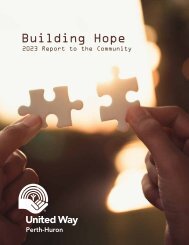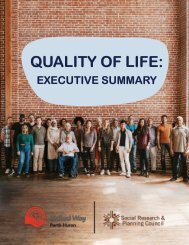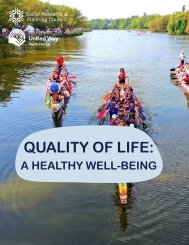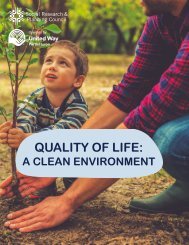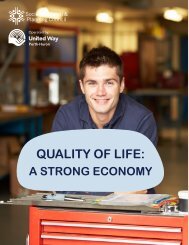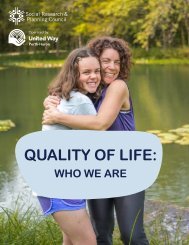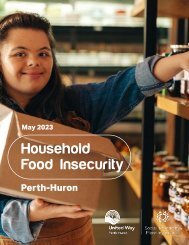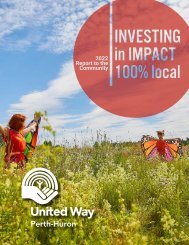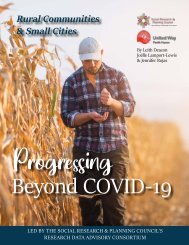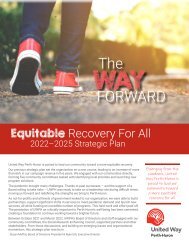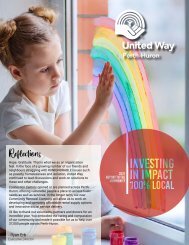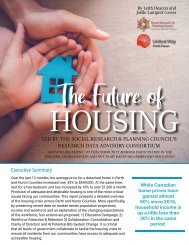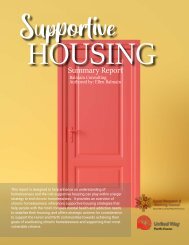2022 06 09 Municipal Election Toolkit for Candidates
This Candidate Information Package was created by the Social Research and Planning Council (SRPC) to serve as a resource to those interested in pursuing their candidacy in the upcoming municipal election. The background on six social justice issues in Perth Huron is presented as are the possible actions to address the burning questions. Numerous resources, both those produced by the SRPC and those authored by other local, provincial and national stakeholders, are also included for further reading on each of the following topics: Poverty Housing and Homelessness Income (Living Wage, Basic Income) Mental Health and Addictions Equity, Diversity and Inclusion: Indigenous Issues & Systemic Racism Community Safety and Well-Being
This Candidate Information Package was created by the Social Research and Planning Council (SRPC) to serve as a resource to those interested in pursuing their candidacy in the upcoming municipal election. The background on six social justice issues in Perth Huron is presented as are the possible actions to address the burning questions. Numerous resources, both those produced by the SRPC and those authored by other local, provincial and national stakeholders, are also included for further reading on each of the following topics:
Poverty
Housing and Homelessness
Income (Living Wage, Basic Income)
Mental Health and Addictions
Equity, Diversity and Inclusion:
Indigenous Issues & Systemic Racism
Community Safety and Well-Being
- No tags were found...
You also want an ePaper? Increase the reach of your titles
YUMPU automatically turns print PDFs into web optimized ePapers that Google loves.
<strong>2022</strong> <strong>Municipal</strong> <strong>Election</strong><br />
<strong>Toolkit</strong> <strong>for</strong> <strong>Candidates</strong><br />
Social Justice Issues<br />
Joëlle Lamport-Lewis<br />
Perth-<br />
Huron
About the<br />
Social Research<br />
and Planning Council<br />
Knowledge Broker<br />
Collaborator<br />
Social Planner<br />
Make Change<br />
As an operational committee of United Way Perth-<br />
Huron, the SRPC consists of individuals from across<br />
Perth-Huron with expertise, experience and an<br />
interest in social justice. Through the collection and<br />
use of evidence-based research and data, the SRPC<br />
seeks to inspire holistic problem solving by providing<br />
its communities and stakeholders with a clear path<br />
<strong>for</strong>ward.<br />
In particular, the SRPC inspires social progress<br />
through research, planning and evidence-based<br />
action, acting both as a Knowledge Broker and as a<br />
Collaborator.<br />
As a Knowledge Broker, the SRPC facilitates,<br />
educates and disrupts. Stakeholders are directly<br />
engaged to address challenges, explore partnerships<br />
to trans<strong>for</strong>m industry practises and lead events to<br />
share expert thinking and promote discussion on a<br />
variety of relevant and locally driven issues (e.g.,<br />
housing, poverty, income).<br />
As a Collaborator the SRPC works together with<br />
community partners on complex social challenges,<br />
discussing practical responses to challenges facing<br />
communities and sharing actions with relevant<br />
stakeholders in cross-disciplinary conversations and<br />
network dialogue.<br />
The goals of the SRPC are there<strong>for</strong>e to:<br />
1. Increase Awareness – Increase awareness and<br />
understanding of community challenges and<br />
opportunities as well as government actions.<br />
2. Identify Patterns – Identify issues and<br />
opportunities across communities and regions.<br />
3. Convene – Connect people and groups to<br />
create opportunities in communities.<br />
4. Build Capacity – Share knowledge and<br />
research.<br />
5. Propose Action – Identify opportunities <strong>for</strong><br />
action and build on the momentum, harness<br />
insights and solutions from the community and<br />
share this knowledge and research.<br />
Poverty<br />
Housing &<br />
Homelessness<br />
Income<br />
Mental Health &<br />
Addictions<br />
Equity, Diversity<br />
& Inclusion<br />
Safety<br />
& Well-being<br />
Background<br />
This Candidate In<strong>for</strong>mation Package was created<br />
by the Social Research and Planning Council<br />
(SRPC) to serve as a resource to those interested in<br />
pursuing their candidacy in the upcoming municipal<br />
election. The background on six social justice issues<br />
in Perth Huron is presented as are the possible<br />
actions to address the burning questions. Numerous<br />
resources, both those produced by the SRPC and<br />
those authored by other local, provincial and national<br />
stakeholders, are also included <strong>for</strong> further reading on<br />
each of the following topics:<br />
• Poverty<br />
• Housing and Homelessness<br />
• Income (Living Wage, Basic Income)<br />
• Mental Health and Addictions<br />
• Equity, Diversity and Inclusion:<br />
Indigenous Issues & Systemic Racism<br />
• Community Safety and Well-Being<br />
This document is also intended to provide an<br />
understanding of the local landscape and the need<br />
<strong>for</strong> a shared governance solution. Federal, provincial,<br />
territorial and municipal governments need to<br />
cooperate in order to deliver programs and services<br />
such as health care and social welfare to all citizens.<br />
We have moved away from this model in favour of<br />
federal government retrenchment and “flexibility”<br />
<strong>for</strong> provinces and territories, resulting in weakened<br />
accountability, the erosion of national standards and<br />
further fragmentation of Canada’s patchwork of social<br />
programs. The federal government must work with the<br />
provinces, territories, municipalities and Indigenous<br />
communities in the funding of services and the setting<br />
of standards. Federal transfers to the provinces and<br />
territories and equalization payments are integral to<br />
supporting universal programs in Canada.
MUNICIPAL GOVERNMENT<br />
RESPONSIBILITIES<br />
*May differ by region<br />
The provincial government determines the powers of municipal governments.<br />
<strong>Municipal</strong> governments in Ontario are responsible <strong>for</strong> providing many of the<br />
services within their local boundaries that you rely on daily such as:<br />
● Airports<br />
● Ambulance<br />
● Animal Control and Bylaw En<strong>for</strong>cement<br />
● Arts and Culture<br />
● Child Care<br />
● Economic Development<br />
● Fire Services<br />
● Garbage Collection and Recycling<br />
● Electric Utilities<br />
● Library Services<br />
● Long-term Care and Senior Housing<br />
● Maintenance of Local Road Network<br />
● Parks and Recreation<br />
● Public Transit<br />
● Planning New Community Developments<br />
and Enhancing Existing Neighbourhoods<br />
● Police Services<br />
● Property Assessment<br />
● Provincial Offences Administration<br />
● Public Health<br />
● Sidewalks<br />
● Snow Removal<br />
● Social Services<br />
● Social Housing<br />
● Storm Sewers<br />
● Tax Collection<br />
● Water and Sewage<br />
THE CURRENT CONTEXT<br />
The COVID-19 pandemic had a disproportionate<br />
impact on marginalized and vulnerable people. Over<br />
the past two years, rural communities and small cities<br />
have experienced an influx of change. It is imperative<br />
to recognize local opportunities <strong>for</strong> progress that<br />
address vulnerabilities and make us more resilient.<br />
Social Research and Planning Council’s Goal:<br />
What is Social Justice?<br />
Social justice is the assertion of the ideal that<br />
all humans should have the same rights and<br />
opportunities. From access to health care to safe<br />
spaces to live, social justice aims to level the playing<br />
field and eliminate discrimination. The idea behind<br />
social justice is we all have innate value as human<br />
beings and no person’s value is more or less than<br />
anyone else’s.<br />
Exploring Major Social Justice Issues<br />
in Perth-Huron<br />
Different social justice issues come to the <strong>for</strong>efront<br />
at different times, and certain issues might be more<br />
relevant across different countries, societies, cultures,<br />
cities and neighborhoods. They affect people’s access<br />
to different types of goods, services and opportunities.<br />
Social justice issues are often wide-ranging and<br />
diverse. Below are a few of concern locally today.
POVERTY<br />
Question:<br />
How has the COVID-19 pandemic<br />
affected our most vulnerable citizens?<br />
Ideal Response<br />
The COVID-19 pandemic heightened inequities in our<br />
communities. Our goal is to build toward an equitable<br />
recovery. This requires lifting people out of poverty in<br />
a dignified manner by ensuring they can af<strong>for</strong>d basic<br />
needs such as safe and af<strong>for</strong>dable housing, healthy<br />
food and health care; ensure economic barriers —<br />
such as child care, transportation, racial and gender<br />
discrimination — are reduced; and promote full<br />
participation in society and equitable opportunities <strong>for</strong><br />
vulnerable people.<br />
Actions<br />
► Support individuals in filing taxes<br />
► Promote Living Wage to employers<br />
► Support a Food Policy Council<br />
in Canada and healthy food <strong>for</strong><br />
all Canadian school kids 1<br />
► Support oral health programs<br />
Background<br />
The pandemic has increased the number of people<br />
in our communities struggling to af<strong>for</strong>d food, find<br />
af<strong>for</strong>dable homes and/or experiencing homelessness.<br />
A collective response is needed to engage community<br />
organizations to meet these basic and strategic<br />
needs.<br />
The COVID-19 pandemic highlighted health<br />
inequalities within racialized, Indigenous, Black and<br />
low-income communities. 2 People living in lowincome<br />
neighbourhoods were hospitalized at over<br />
double the rate of those living in higher income areas.<br />
Housing af<strong>for</strong>dability <strong>for</strong> low-income families — rental<br />
and ownership — continues to outpace wage growth.<br />
There are long-term effects and families are struggling<br />
in areas such as nutrition, education, transportation,<br />
childcare and health care.<br />
● Perth Huron vacancy rates sit at 0–0.7%. 3<br />
● Across Perth-Huron the average price of homes<br />
sold in September 2021 was $615,459, up 33.7%<br />
from September 2020.<br />
● A jurisdictional market scan (2018–2021)<br />
highlighted a continued increase in rental market<br />
rates of 58–74% since 2018. 4<br />
Sources<br />
In 2020,<br />
there was a<br />
50% increase in<br />
food bank visits<br />
at the Huron County<br />
Food Bank Distribution<br />
Centre<br />
1<br />
Coalition <strong>for</strong> Healthy School Food. <strong>2022</strong>. Healthy Food <strong>for</strong><br />
All Canadian school kids foodsecurecanada.org/resourcesnews/news-media/we-want-national-healthy-school-foodprogram<br />
2<br />
Centres <strong>for</strong> Disease Control and Prevention. January <strong>2022</strong>.<br />
Health Equity Considerations and Racial and Ethnic Minority<br />
Groups www.cdc.gov/coronavirus/2019-ncov/community/<br />
health-equity/race-ethnicity.html<br />
3<br />
CREA The Canadian Real Estate Association, Huron Perth<br />
Association of Realtors. January <strong>2022</strong><br />
https://creastats.crea.ca/board/huro<br />
4<br />
Strat<strong>for</strong>d Business Case <strong>for</strong> Alternate AMR 2021<br />
www.strat<strong>for</strong>d.ca/en/inside-city-hall/housing.aspx<br />
5<br />
Household food Insecurity in Canada, March 2021, Canada<br />
Food Insecurity Policy Research proof.utoronto.ca/foodinsecurity/<br />
6<br />
Arrell Food Institute, University of Guelph. December 2021<br />
news.uoguelph.ca/2021/12/food-price-report-families-to-paynearly-1000-more-<strong>for</strong>-food-in-<strong>2022</strong>/<br />
Food Insecurity<br />
Household food insecurity — the inadequate or<br />
insecure access to food due to financial constraints<br />
— is a serious public health problem in Canada. It<br />
negatively impacts physical, mental, and social health<br />
and costs our health care system considerably. 5 By<br />
the time someone reports they are struggling to put<br />
food on the table, they are also struggling to af<strong>for</strong>d<br />
other basic needs.<br />
Household food insecurity is closely linked to income.<br />
As a household’s income declines, the risk of food<br />
insecurity increases. In 2021, the average Canadian<br />
family paid up to an extra $966 <strong>for</strong> food. For an<br />
average family of four, that means a $14,767 annual<br />
grocery bill. 6<br />
Local data identifies:<br />
● Huron County food banks reported 33% of visits<br />
involved children and 15% seniors (60+), with a<br />
total of 17,675 visits in 2021.<br />
● The Huron County Food Bank Distribution Centre<br />
Mobile Food Bank (MFB) program had 5,268<br />
visits, up 50.68% over 2020.<br />
● In total, there were 22,943 visits in 2021 (20,961<br />
in 2020) to Huron County food banks & MFB<br />
program.<br />
● In Perth County (Strat<strong>for</strong>d & St. Marys included)<br />
the four food banks served reported 12% serving<br />
seniors (60+) and 31% serving children with a<br />
total of 5,726 visits.<br />
► Learn More<br />
• How Much Is Enough? report: https://perthhuron.<br />
unitedway.ca/wp-content/uploads/2019/10/2019-<br />
<strong>09</strong>-05-How-Much-is-Enough-Website-version-<br />
FINAL.pdf<br />
• Photovoice project: https://perthhuron.unitedway.<br />
ca/community-resources/social-research-planningcouncil/photovoice/<br />
• Canadian Institute <strong>for</strong> Health In<strong>for</strong>mation report:<br />
https://www.cihi.ca/en
Housing and Homelessness<br />
Question:<br />
How can municipalities participate in<br />
solutions addressing the local housing crisis?<br />
Ideal Response<br />
<strong>Municipal</strong>ities must work in collaboration with<br />
provincial and federal government programs<br />
addressing gaps <strong>for</strong> renters and expanding attainable<br />
and af<strong>for</strong>dable market and non-market housing units*.<br />
Opportunities <strong>for</strong> municipalities to address the<br />
housing crisis through social and economic solutions<br />
will ensure all Perth-Huron citizens have access to<br />
adequate, attainable and af<strong>for</strong>dable housing.<br />
CMHA definitions:<br />
● Af<strong>for</strong>dable Housing — costs less than 30% of a<br />
household’s be<strong>for</strong>e-tax income<br />
● Attainable Housing — housing that is adequate<br />
in condition (no major repairs needed),<br />
appropriate in size (bedrooms appropriate <strong>for</strong><br />
household), af<strong>for</strong>dable (costing less than 30%<br />
of be<strong>for</strong>e-tax income), accessible to Services<br />
(located in areas where common services are<br />
available) and available (a range of housing types)<br />
Background<br />
AMO highlights the state of Ontario’s housing crisis.<br />
Housing is in short supply. Home ownership is out of<br />
reach <strong>for</strong> many. Rents are too high relative to incomes<br />
and people experiencing homelessness in Ontario<br />
desperately need a roof over their heads.<br />
The lack of suitable af<strong>for</strong>dable housing in Ontario is<br />
a significant problem that all orders of government<br />
must work together to address in partnership with the<br />
private, non-profit, and co-operative housing sectors.<br />
152 people<br />
in Perth &<br />
169 in Huron<br />
are experiencing<br />
homelessness<br />
as of March <strong>2022</strong><br />
Actions<br />
Association of <strong>Municipal</strong>ities Ontario’s (AMO)<br />
outstanding recommendations to address the housing<br />
supply and af<strong>for</strong>dability crisis remain relevant.<br />
► Update and modernize planning policies<br />
and procedures where applicable<br />
The federal and provincial governments have<br />
recognized the severe housing challenges facing<br />
families and came together recently with various<br />
strategies, plans and funding programs addressing<br />
the issue. While these initiatives are welcome, more<br />
must be done to meet the housing challenges faced<br />
by people in our communities. AMO recommendations<br />
listed above remain relevant.<br />
► Create building incentives <strong>for</strong><br />
af<strong>for</strong>dable, attainable housing<br />
development<br />
► Explore an accommodation tax<br />
► Increase the supply of Af<strong>for</strong>dable<br />
Market Housing <strong>for</strong> families<br />
► Expand af<strong>for</strong>dable housing options<br />
► Address homelessness<br />
► Utilize innovative housing<br />
solutions including supportive, cooperative<br />
and social housing<br />
► Support people with their health care<br />
needs <strong>for</strong> successful tenancy<br />
Source<br />
7, 8<br />
Association of <strong>Municipal</strong>ities Ontario, August 2019.<br />
Fixing the Housing Af<strong>for</strong>dability Crisis. www.amo.on.ca/<br />
sites/default/files/assets/DOCUMENTS/Reports/2019/<br />
FixingHousingAf<strong>for</strong>dabilityCrisis20190814.pdf<br />
► Learn More<br />
• Future of Housing: perthhuron.unitedway.ca/<br />
wp-content/uploads/<strong>2022</strong>/02/<strong>2022</strong>-02-10-The-<br />
Future-of-Housing-FINAL.pdf<br />
• Supportive Housing: perthhuron.unitedway.ca/<br />
wp-content/uploads/2021/<strong>06</strong>/2021-Supportive-<br />
Housing-Report.pdf<br />
• Lived Experience Expert Panel report:<br />
perthhuron.unitedway.ca/wp-content/<br />
uploads/2021/05/Leep-Summary-Formatted.pdf<br />
• Association of <strong>Municipal</strong>ities. Fixing the Housing<br />
Af<strong>for</strong>dability Crisis. 2019: www.amo.on.ca/sites/<br />
default/files/assets/DOCUMENTS/Reports/2019/<br />
FixingHousingAf<strong>for</strong>dabilityCrisis20190814.pdf
Income; Living Wage, Basic Income<br />
Question:<br />
How do rural communities and small<br />
cities create community resiliency?<br />
Ideal Response<br />
Supporting living wage employers is a start in<br />
achieving a sustainable quality of life in Perth-Huron.<br />
The concept of a living wage is bigger than income.<br />
It is about ensuring our neighbours can af<strong>for</strong>d to pay<br />
their rent and buy nutritious food, our workers are<br />
healthy and able to pay <strong>for</strong> transportation to get to<br />
work every day and our children are given sufficient<br />
social and educational opportunities so they can<br />
flourish.<br />
Basic income can be good <strong>for</strong> business. Putting<br />
money in citizen’s hands lets them spend it in their<br />
local economies, which could cause private capital<br />
investments to increase up to $15 billion a year<br />
— more than double all Canadian venture capital<br />
investments in a year. 9<br />
Actions<br />
57% of people<br />
with income make<br />
less than $35,000<br />
annually in<br />
Perth-Huron<br />
► Provide incentives (e.g. tax, fees,<br />
etc.) 10 encouraging local business<br />
owners to pay a living wage.<br />
► Provide public support by writing a letter<br />
or meeting with the Member of<br />
Parliament that basic income can<br />
grow Canada’s economy while ending<br />
poverty and growing the middle class<br />
► Discuss living wage and basic income<br />
at the Warden’s Caucus meetings,<br />
Regional <strong>Municipal</strong> meetings, etc.<br />
Living Wage 16<br />
Fostering resiliency in small cities and rural<br />
communities requires economic flexibility and the<br />
ability to recognize new opportunities moving <strong>for</strong>ward.<br />
The purpose of the living wage is to strengthen and<br />
support local employers’ ef<strong>for</strong>ts to attract and retain<br />
employees. The living wage is a response to the rise<br />
in precarious employment and a key part of economic<br />
growth, providing workers and their families with a<br />
better way of life, benefiting employers and helping<br />
build more vibrant and healthy communities.<br />
Living wage helps bridge the gap:<br />
● Work<strong>for</strong>ce: Perth-Huron is a region that needs<br />
to attract and retain a work<strong>for</strong>ce. Collectively,<br />
we are a community of low unemployment rates<br />
and precarious employment. Securing a living<br />
wage assists in the retention and attraction of<br />
employees to our community.<br />
● Income: Income levels have not kept pace with<br />
the rate of inflation. A living wage helps narrow the<br />
inflation rate gap.<br />
● Housing: Development of all types of housing is<br />
critical to economic and social development within<br />
Perth-Huron. A diverse selection of housing will<br />
attract families and skilled labourers<br />
Basic Income<br />
According to a new report basic Income can grow<br />
Ontario’s economy $40B/year, add 287,000 jobs<br />
Canadian Centre <strong>for</strong> Economic Analysis. 17<br />
● Basic income is a sustainable investment that can<br />
grow Ontario’s economy, create jobs, raise wages,<br />
and support businesses while ending poverty.<br />
● Basic income can be good <strong>for</strong> business. Putting<br />
money in Canadians’ hands lets them spend it in<br />
their local economies, which could cause private<br />
capital investments to increase up to $15 billion<br />
a year — more than double all yearly Canadian<br />
venture capital investments.<br />
● Basic income is a raise <strong>for</strong> working Canadians.<br />
Economic activity from basic income would cause<br />
businesses to hire, spending up to $32 billion a<br />
year in total wages — as much as the profits of<br />
our top three banks.<br />
● Basic income can be a self-sustaining investment.<br />
Basic income could grow the economy more than<br />
it costs in the long term, making this a sustainable<br />
investment over time. It could generate $22 billion<br />
a year in new government revenues from new<br />
economic activity — as much as all EI Premiums<br />
paid by employees and employers.<br />
Basic income is a raise <strong>for</strong> working Canadians.<br />
Economic activity from basic income would cause<br />
businesses to hire, spending up to $32 billion a year<br />
in total wages — as much as the profits of our top<br />
three banks. 9<br />
Background<br />
Many people struggling financially prior to the<br />
pandemic were unprepared <strong>for</strong> a brief emergency, let<br />
alone prolonged economic shutdowns:<br />
● 57% of people with incomes make less than<br />
$35,000 in Perth-Huron. 11<br />
● 30% of employees worked longer hours, with the<br />
number of employees working 41–51 hours per<br />
week doubling from 2019 to 2020. 12<br />
● In 2019, 4% of the population at Perth and Huron<br />
had more than one paid job and that number<br />
increased to 6% in 2020. 13<br />
COVID-19 has increased hardship and risk <strong>for</strong> those<br />
with lower incomes 14 — curtailing services they relied<br />
on to make ends meet, increasing daily living costs,<br />
deepening social isolation and exposing low-wage<br />
essential workers to increased health risks. In 2019,<br />
23% of families in Huron and 28% families in Perth<br />
were identified as low-income family status. 15<br />
Sources<br />
9<br />
Canadian Centre <strong>for</strong> Economic Analysis (CANCEA) Report<br />
(December 2020) Potential Economic Impacts and Reach of<br />
Basic Income Programs in Canada<br />
assets.website-files.m/5f07c00c5fce40c46b92df3d/5fcf8ed17fb77<br />
568bd94cfcb_Potential%20Impacts%20and%20Reach%20of%20<br />
Basic%20Income%20Programs%2020201203%20FINAL.PDF.pdf<br />
10<br />
Canadian Centre <strong>for</strong> Economic Analysis (CANCEA)<br />
Report(December 2020) Potential Economic Impacts and Reach<br />
of Basic Income Programs in Canada<br />
https://www.cancea.ca/publications/ubi<br />
11<br />
Statistic Canada, Tax filers and dependants with income by total<br />
income, sex and age<br />
www150.statcan.gc.ca/t1/tbl1/en/tv.action?pid=1110000801<br />
12<br />
UWC Demographics and Community Dashboard, Environics<br />
Analytics Data, Community Life Part 3. (WHW120C1, ...C11, C21,<br />
C31, C36, C41, C51) https://www.unitedway.ca/<br />
13<br />
UWC Demographics and Community Dashboard, Environics<br />
Analytics Data, Community Life Part 3 Variable WHW1101<br />
14<br />
Statistic Canada, Financial resilience and financial well-being<br />
of Canadians during the COVID-19 pandemic. September 2021<br />
www150.statcan.gc.ca/n1/pub/75f0002m/75f0002m2021008-eng.<br />
htm<br />
15<br />
Statistics Canada Annual Income Estimates <strong>for</strong> Census<br />
Families, Individuals and SeniorsT1 Family File, Final Estimates,<br />
2019. https://www150.statcan.gc.ca/n1/en/catalogue/72-<br />
212-X2021001<br />
16<br />
SRPC Perth Huron 2020 Living Wage perthhuron.unitedway.ca/<br />
wp-content/uploads/2021/11/Perth-Huron-Living-Wage-2021.pdf<br />
● Basic income could grow the economy sustainably<br />
while lifting 3.2 million families out of poverty and<br />
growing the middle class.<br />
► Learn More<br />
• Perth-Huron Living Wage 2021:<br />
perthhuron.unitedway.ca/wp-content/<br />
uploads/2021/11/Perth-Huron-Living-Wage-2021.<br />
pdf<br />
• Lived Experience Expert Panel; Basic<br />
Income: perthhuron.unitedway.ca/wp-content/<br />
uploads/2021/01/2021-01-27-LEEP-Report-<br />
FINAL.pdf<br />
• Basic Income report: perthhuron.unitedway.ca/wp-<br />
content/uploads/2020/07/2020-07-16-Quarterly-<br />
Report-Basic-Income.pdf<br />
• Canadian Centre <strong>for</strong> Economic Analysis Report<br />
https://assets.website-filescom/5f07c00c5fce<br />
40c46b92df3d/5fcf8ed17fb77568bd94cfcb_<br />
Potential%20Impacts%20and%20Reach%20<br />
of%20Basic%20Income%20Programs%20<br />
20201203%20FINAL.PDF.pdf<br />
17<br />
Economic Impacts and Reach <strong>for</strong> Basic Income Programs in<br />
Canada: CANCEA Report www.ubiworks.ca/groweconomy
Mental Health and Addictions<br />
Question:<br />
What can we do about increased mental health<br />
and addictions needs in our community?<br />
Ideal Response<br />
<strong>Municipal</strong>ities deliver community health, income<br />
support and social services, recreation, housing,<br />
and policing services, all of which connect to mental<br />
health. Mental health and addictions cause some<br />
of the most serious challenges in our communities<br />
and those who suffer from them are among those in<br />
greatest need.<br />
We can change the narrative around mental health<br />
and addictions through education and awareness,<br />
decreasing stigmas and increasing investments in<br />
collaborative local solutions.<br />
Action<br />
► Invest in the Mobile Crisis Rapid Response<br />
Teams (MCRRT) in Perth-Huron and<br />
explore opportunities to invest in Crisis<br />
Outreach and Support Team (COAST).<br />
Mobile teams consist of a plainclothes police<br />
officer and a mental health professional<br />
(Registered Nurse, Occupational Therapist, or<br />
Social Worker) driving an unmarked car. The team<br />
provides mobile assessments and support to<br />
people who may be experiencing a mental health<br />
crisis.<br />
► Educate ourselves and ensure the public<br />
is aware of the supports available.<br />
► Decrease stigma around mental<br />
health and addictions — particularly<br />
in males — and create safe spaces<br />
<strong>for</strong> dialogue to raise awareness<br />
of the mental health crisis.<br />
► Strengthen partnerships in decreasing<br />
barriers to access of services in rural,<br />
remote communities. (e.g., support<br />
virtual care, internet communications<br />
technology and accessibility)<br />
► Support non-profit and charitable<br />
mental health and addictions (MHA)<br />
community organizations and services.<br />
Background<br />
Current realities in Perth-Huron: 18,19<br />
● 80% more people self-assessed their mental<br />
health as poor since the onset of the pandemic.<br />
● Youth, females and those with low income<br />
experienced mental health decline at higher rates.<br />
● In any given year, 14–20% of the population will<br />
personally experience a MHA problem or illness.<br />
Taking the conservative estimate of 14%, this<br />
equates to 20,580 of the total rostered patient<br />
population <strong>for</strong> the Huron Perth and Area - Ontario<br />
Health Team (HPA-OHT), including children and<br />
youth.<br />
● Mental Health impacts people from all walks of<br />
life, regardless of age, education, income level or<br />
culture.<br />
● Over 24,000 people in Perth-Huron could benefit<br />
from some level of MHA services.<br />
● The economic cost of mental illness nationally is<br />
estimated at $51 billion/year.<br />
● In Ontario, the annual cost of alcohol-related<br />
health care, law en<strong>for</strong>cement, corrections, lost<br />
productivity and other problems is estimated to be<br />
at least $5 billion.<br />
● 70% of mental health issues start during childhood<br />
or adolescence.<br />
Sources<br />
18<br />
SRPC, 2021. Forward Together: An integrated approach to<br />
Mental Health and Addictions in Huron Perth<br />
perthhuron.unitedway.ca/wp-content/uploads/2021/04/<br />
Forward-Together.pdf<br />
19<br />
University of Guelph, 2021, Mental Health Across<br />
Perth-Huron perthhuron.unitedway.ca/wp-content/<br />
uploads/2021/05/Rural-Response-Mental-health-and-<br />
COVID-19-1.pdf<br />
The Government of Ontario outlines the system<br />
challenges in the “Roadmap to Wellness: A Plan to<br />
Build Ontario’s Mental Health and Addiction System,<br />
2020” and will impact local needs as outlined:<br />
● Wait Times — Demand <strong>for</strong> MHA services<br />
exceeds available capacity, often resulting in long<br />
wait times <strong>for</strong> services.<br />
● Barriers to Access — Community residents do<br />
not know what services exist or where and how to<br />
get help.<br />
● Fragmentation — Poor coordination across the<br />
system results in inefficiencies and poor client and<br />
family experiences as people struggle to navigate<br />
between services.<br />
● Uneven Quality — Consistency and quality<br />
of services vary from provider to provider and<br />
between regions.<br />
● Lack of Data — Communities, service providers<br />
and system planners do not have access to the<br />
in<strong>for</strong>mation they need, limiting effective oversight<br />
and accountability.<br />
► Learn More<br />
14-20% of the<br />
population will<br />
experience a mental<br />
health or addiction<br />
challenge each year<br />
• Forward Together: perthhuron.unitedway.ca/wpcontent/uploads/2021/04/Forward-Together.pdf<br />
• Rural Response to COVID-19: perthhuron.<br />
unitedway.ca/wp-content/uploads/2021/04/2021-<br />
04-23-Response-to-COVID_Mental-Health-<br />
Across-P-H-FULL-REPORT.pdf<br />
• Roadmap to Wellness: A Plan to Build Ontario’s<br />
Mental Health and Addiction System, 2020: www.<br />
ontario.ca/page/roadmap-wellness-plan-buildontarios-mental-health-and-addictions-system
Equity, Diversity and Inclusion:<br />
Indigenous Issues & Systemic Racism<br />
Question:<br />
Why is equity, diversity and inclusion<br />
important to communities in Perth-Huron?<br />
Ideal Response<br />
Perth-Huron communities are at a critical point<br />
in needing to strengthen an equitable social and<br />
economic future. Creating more inclusive and<br />
welcoming communities where everyone feels they<br />
belong will provide a safe, sustainable future <strong>for</strong> all.<br />
Action<br />
► Develop training, protocols and<br />
accountabilities to ensure a culture<br />
of inclusion in workplaces.<br />
► A commitment to an action plan,<br />
funding and a timeline to complete<br />
all of the Calls of Action and Calls<br />
<strong>for</strong> Justice as soon as possible.<br />
► A commitment to a comprehensive antiracism<br />
action plan to provide directions<br />
on initiatives aimed at combatting<br />
anti-Black, anti-Indigenous, anti-Asian<br />
and all other <strong>for</strong>ms of racism.<br />
8 in 10 Indigenous<br />
residents of Perth-<br />
Huron report being<br />
discriminated<br />
against in the past<br />
three years<br />
Background<br />
Research shows that health, social and economic<br />
inequities led to the pandemic having a greater<br />
impact on Indigenous, Black, Asian and racialized<br />
communities, who are significantly more at risk<br />
of exposure to COVID-19 and who experienced<br />
far higher rates of infection and mortality than<br />
other communities. Workers in these communities<br />
experienced much higher rates of unemployment<br />
during the pandemic because they faced systemic<br />
disadvantages such as lower paid precarious work,<br />
fewer career advancement opportunities and less<br />
access to basic services.<br />
The COVID-19 pandemic has affected all parts of<br />
the work<strong>for</strong>ce and to ensure a strong economic<br />
recovery, we cannot lose sight of the critical economic<br />
contribution women and vulnerable populations make.<br />
A research paper commissioned by the Huron County<br />
Immigration Partnership shows that: 20<br />
● 8 in 10 Indigenous residents of Perth-Huron report<br />
being discriminated against in the past three<br />
years.<br />
● 7 in 10 visible minorities report they’ve been<br />
discriminated against, compared to 5 in 10 white,<br />
non-immigrants.<br />
● To compare, 6 in 10 members of London’s<br />
Indigenous population reported discrimination over<br />
the same period, while 4 in 10 visible minorities<br />
reported at least one act of discrimination since<br />
2018.<br />
● The unflattering report comes at a time when<br />
Perth-Huron needs to attract more residents to fill<br />
hundreds of jobs. Many of those new residents<br />
will be visible minorities who have no tolerance <strong>for</strong><br />
discrimination based on an individual’s skin colour.<br />
Source<br />
20<br />
Natalia Lapshina, PhD., Victoria M. Esses, Ph.D. Network<br />
<strong>for</strong> Economic Trends (NEST) Western University. March<br />
2021. Huron County Immigration Partnership. Discrimination<br />
Experienced by Immigrants, Visible Minorities, and<br />
Indigenous People in Huron Perth<br />
www.huroncounty.ca/wp-content/uploads/2021/11/2021-11-<br />
16-Report-Discrimination-Huron_Perth.pdf<br />
Indigenous Peoples<br />
The Truth and Reconciliation Commission’s 94 Calls<br />
to Action were released in December 2015. More<br />
than five years later, only 14 have been completed<br />
and 20 have seen no progress at all. It has been over<br />
two years since the release of the National Inquiry<br />
into Missing and Murdered Indigenous Women and<br />
Girls report with no plan of action. As the remains of<br />
more and more children on the grounds of <strong>for</strong>mer<br />
residential schools are revealed, non-Indigenous<br />
Canadians can no longer turn a blind eye to the<br />
structural injustices and violence faced by Indigenous<br />
peoples.<br />
Persons with Disabilities<br />
The pandemic impacted people with disabilities more<br />
severely than many Canadians. A Statistics Canada<br />
survey showed over one third of people with longterm<br />
health conditions or disabilities experienced a<br />
temporary or permanent job loss or reduced hours<br />
during the pandemic. Over half had difficulty meeting<br />
at least one financial obligation or essential need. The<br />
pandemic exposed the inadequacy of current financial<br />
support provided to persons with disabilities.<br />
Gender Equity<br />
Women were disproportionately impacted by the<br />
pandemic, whether because they took on most of<br />
the burden of home schooling, child care and elder<br />
care, or because they were more likely to be working<br />
in the front line service sector and health care jobs,<br />
or because they were more likely to have lost work<br />
due to the pandemic. Even women in academia<br />
published significantly less than in previous years and<br />
significantly less than their male counterparts.<br />
► Learn More<br />
• Discrimination Experienced by Immigrants,<br />
Visible Minorities, and Indigenous People in<br />
Huron Perth: www.huroncounty.ca/wp-content/<br />
uploads/2021/11/2021-11-16-Report-Discrimination-<br />
Huron_Perth.pdf<br />
• Truth and Reconciliation Calls to Action:<br />
www2.gov.bc.ca/assets/gov/british-columbians-ourgovernments/indigenous-people/aboriginal-peoplesdocuments/calls_to_action_english2.pdf
Community Safety & Well-Being<br />
Question:<br />
What is Community Safety?<br />
Ideal Response<br />
Community safety is about helping communities be<br />
and feel safe. It is important that people feel safe<br />
where they grow, live, work and spend leisure time.<br />
There are ways people can get involved to help<br />
improve safety in their own communities. It is a<br />
shared responsibility of all members of the community<br />
and requires an integrated approach.<br />
Community safety and well-being (CSWB) plans<br />
are developed to address root causes of crime and<br />
complex social issues by focusing holistically on<br />
social development, prevention and risk prevention.<br />
These plans recognize that complex issues cannot<br />
be addressed in isolation or solely on an incident<br />
response basis.<br />
The goal of this plan is to achieve a sustainable<br />
community where everyone feels safe, has a sense<br />
of belonging, opportunities to participate, and where<br />
individuals and families are able to meet their needs<br />
<strong>for</strong> education, health care, food, housing, income, and<br />
social and cultural expression.<br />
Action<br />
► Invest in a CSWB implementation<br />
plan in Huron County.<br />
► Collaborate and/or coordinate with<br />
CSWB implementation in Perth County.<br />
► Invest in community improvement<br />
plans that take into consideration<br />
social planning.<br />
► Identify indicators to monitor and<br />
measure the per<strong>for</strong>mance of the<br />
collaborative CSWB work and to gain<br />
the co-operation of the public with<br />
the police in preventing crime.<br />
Background<br />
In January 2019, new requirements <strong>for</strong> CSWB<br />
planning came into <strong>for</strong>ce. The Police Services Act,<br />
1990 (PSA) was amended and municipalities across<br />
Ontario were given time to develop and adopt a plan.<br />
<strong>Municipal</strong>ities are working on CSWB plans in<br />
partnership with multi-sectoral advisory committees<br />
including representatives from social and community<br />
organizations, school boards, boards of health, the<br />
police service and any other local service providers<br />
working to protect or enhance safety and well-being<br />
(e.g., mental health, addictions, violence against<br />
women, af<strong>for</strong>dable and attainable housing, safety,<br />
food security and recreational opportunities).<br />
1,557 calls were<br />
made to police <strong>for</strong><br />
intimate partner<br />
violence in 2021<br />
in Perth-Huron<br />
Gender-Based Violence<br />
Gender-based violence and violence against<br />
women includes violence based on gender norms<br />
and unequal power dynamics, committed against<br />
someone based on their gender, gender expression,<br />
gender identity or perceived gender. It takes many<br />
<strong>for</strong>ms, including physical, economic, sexual as well as<br />
emotional abuse.<br />
In Huron in 2021 there were 617 calls to police<br />
reporting intimate partner violence. 21 In Perth there<br />
were 940. 22<br />
Actions:<br />
► Need <strong>for</strong> gender-based violence<br />
prevention and sustainable core funding.<br />
► General public awareness of gender<br />
inequity and gender-related oppression.<br />
► Applying a gender lens could make Huron<br />
Perth a better community <strong>for</strong> everyone.<br />
► Need <strong>for</strong> better access to mental<br />
health services and resources <strong>for</strong><br />
anyonescaping gender-based violence/<br />
unsafe domestic situations.<br />
► Learn More<br />
Source<br />
21<br />
Huron Domestic Assault Review Team (<strong>2022</strong>)<br />
22<br />
Snapshot 2021, STOP Violence Against Women<br />
Coordinating Committee of Perth County (2021)<br />
• Community Safety and Well-Being Plan Perth:<br />
https://www.cswb-strat<strong>for</strong>dperthstmarys.com/<br />
• Community Safety and Well-Being Huron: https://<br />
www.northhuron.ca/en/living-here/Huron%20<br />
County%20CSWB%202021.pdf
United Centre 32 Erie St., Strat<strong>for</strong>d,<br />
ON Canada N5A 2M4<br />
Tel: 519-271-7730 | 1877-818-8867<br />
srpc@perthhuron.unitedway.ca



